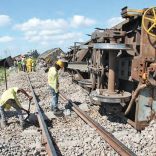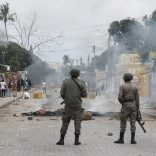Mozambique: Calm New Year’s transition at HCM
Hidden debts overshadowing the lives and dreams of Mozambicans for over a year

Paiva António had to forget the marriage he had planned and the house he wanted to build, all because of the financial crisis affecting Mozambique, worsened by the hidden state debts discovered a year ago.
“I was affected by a chain of events [with the crisis]. I sell clothes but, for a year now, people are spending more on food. My sales went down from 10 to three items a day,” he told Lusa.
“I could not get married, much less lay the foundations for a house on a plot that I’ve owned since 2015,” the street vendor laments.
He left Maputo to travel the thousand kilometres by road to try his luck in Chimoio, capital of Manica province.
“It is the people, who have nothing, who will feel the pain of all this. We are the ones who will pay for these goings-on,” says Maria Macuacua, a 43-year-old vendor in the Xiquelene market, one of Maputo’s main markets.
Maria Macuacua is illiterate and knows “very little” about economics, but her 16 years’ experience in the market leads her to associate the country’s crisis with what she calls “maneouvres”.
“There is no money in the market. People are not buying anything here and the argument is that the dollar is expensive,” she complains, while busily promoting “the best tomato in the area” on her makeshift stall in the midst of the customary Xiquelene chaos.
She has two daughters who depend on her small stall for their education, and Maria Macuacua fears for their future: will they have to “pay a debt they know nothing about”?
Essential commodities like rice, oil and soap have doubled in price in the markets, reducing the margin for savings and eating away at investment income.
“Since the discovery of the debt, there has been an incredible increase in the prices of essential products and a free-fall in personal plans,” José Machava, a civil servant in Chimoio, told Lusa.
Machava lives with six children and had planned to repair the walls of the house before the crisis forced him to postpone the work. His salary is just enough “to pay for the rental of the house and the food”. Bills for the schooling and health care get paid “in dribs and drabs”, he said.
Ernesto Magaia, a grade 12 student at Laulane High School in Maputo, sees the hidden debts as a stain on the reputation of a country that “already had many problems”.
Ernesto sells mobile phone recharges in the Magoane square market, outside the Mozambican capital. He lives with his three brothers and his grandmother.
“It is a situation that mars our international image, at a time when the country still had the political crisis,” he said.
“We were almost always an example in the region, and we should have tried to ensure that this remained the case. The worst of all is that, deep down, those who will have to tighten the belts are us, the people,” he added.
By Estevão Azarias Chavisso and André Catueira












Leave a Reply
Be the First to Comment!
You must be logged in to post a comment.
You must be logged in to post a comment.